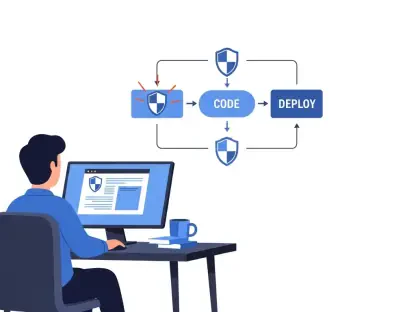Introduction
Imagine a scenario where an enterprise’s development team, eager to innovate, deploys an AI tool without oversight, inadvertently exposing sensitive data to compliance risks. This shadow AI usage is becoming a startling reality for many organizations, highlighting a critical gap in traditional DevOps practices. With artificial intelligence transforming software development at an unprecedented pace, the need for structured governance within rapid deployment cycles has never been more urgent. This FAQ article aims to explore the emerging concept of DevGovOps, addressing whether it represents a significant evolution of DevOps tailored for the AI era. Readers can expect clear answers to key questions, insights into balancing innovation with control, and an understanding of how governance integrates into modern workflows.
The scope of this discussion centers on defining DevGovOps and its relevance amid rising AI adoption. Key challenges, such as regulatory pressures and unauthorized tool usage, will be examined to provide a comprehensive view of why this concept matters. By the end, clarity on how DevGovOps could shape software development practices will be offered, equipping readers with actionable knowledge for navigating these complexities.
This exploration is designed to break down complex ideas into digestible insights. Whether a developer, IT leader, or business executive, the information provided will shed light on the intersection of AI, governance, and DevOps, paving the way for informed decision-making in a rapidly evolving tech landscape.
Key Questions
What Is DevGovOps and How Does It Differ from DevOps?
DevGovOps is a term gaining traction as an extension of DevOps, focusing on embedding governance directly into the software development and operations pipeline. While DevOps revolutionized collaboration between development and operations teams to enhance speed and efficiency, it often lacks formal mechanisms for oversight, especially with the complexities introduced by AI. The rise of shadow AI—unauthorized use of tools like code-generating models—has exposed vulnerabilities in accountability and compliance, necessitating a framework like DevGovOps to address these gaps.
Unlike traditional DevOps, which prioritizes agility and continuous delivery, DevGovOps introduces structured policies and automated tools to ensure visibility and adherence to regulations without slowing down innovation. For instance, it might involve tracking the origin of AI models used in development or verifying compliance with data privacy laws. This integration aims to create a seamless process where governance is not an afterthought but a core component of the workflow.
The distinction lies in the proactive approach to risk management. By incorporating governance from the outset, DevGovOps seeks to prevent issues rather than react to them, marking a shift toward a more responsible and sustainable model of software delivery in an era dominated by AI-driven tools.
Why Is DevGovOps Becoming Relevant in the AI Era?
The relevance of DevGovOps stems from the unprecedented challenges posed by the rapid integration of AI into software processes. As developers experiment with powerful AI tools to accelerate coding and problem-solving, organizations face risks from unmonitored usage, including security breaches and regulatory violations. This phenomenon, often termed shadow AI, has prompted an urgent need for oversight to protect both the business and its stakeholders.
External pressures amplify this necessity. Boards, regulators, and CIOs are increasingly under scrutiny to manage AI-related risks, driving the demand for governance frameworks that can keep pace with technological advancements. DevGovOps answers this call by embedding automated compliance checks and accountability measures into DevOps pipelines, ensuring that innovation does not come at the cost of integrity.
Evidence of this trend is visible in industry discussions at major conferences, where software delivery leaders emphasize AI supply chain trust and artifact compliance. Such focus underscores that governance is no longer optional but a critical requirement for enterprises aiming to responsibly harness AI’s potential while mitigating associated dangers.
How Can DevGovOps Balance Innovation and Control?
One of the primary concerns surrounding DevGovOps is the potential for governance to stifle the very innovation that DevOps champions, especially in AI experimentation. Excessive bureaucracy could burden developers with cumbersome processes, slowing down delivery and dampening creativity. The challenge lies in implementing oversight that safeguards the organization without hindering progress.
The solution proposed by DevGovOps is to leverage automation for governance tasks, such as real-time monitoring of AI tool usage or automated compliance verification. This approach minimizes manual intervention, allowing developers to focus on creating while ensuring that necessary checks are in place. For example, tools that validate the source of AI models can prevent the use of untrusted resources without requiring constant manual oversight.
Ultimately, the goal is empowerment rather than restriction. A well-designed DevGovOps framework creates a safe environment for experimentation, where developers can push boundaries knowing that guardrails are seamlessly integrated. This balance is essential for maintaining competitive agility in a landscape where AI continues to redefine possibilities.
Is DevGovOps Just Another Buzzword or a Lasting Framework?
Skepticism surrounds new terms in the tech industry, especially variations on DevOps, many of which have faded into obscurity as mere marketing hype. Historical attempts to expand the “Ops” suffix—beyond notable successes like DevSecOps, which embedded security into DevOps—have often failed to deliver lasting value. This raises questions about whether DevGovOps is a genuine evolution or simply a passing trend.
However, the unique pressures of the AI era provide a compelling case for its staying power. Unlike previous iterations, DevGovOps addresses tangible, pressing issues such as regulatory compliance and shadow AI risks, which are top concerns for enterprises today. Its focus on integrating governance as a fundamental element, much like security in DevSecOps, suggests a practical necessity rather than a superficial rebranding.
Industry validation further supports this perspective. Observations from software delivery leaders at prominent events highlight alignment between DevGovOps principles and real-world enterprise needs, indicating that it could become a cornerstone for responsible AI adoption. This suggests a framework with the potential to endure rather than disappear.
Summary
This FAQ distills the essence of DevGovOps as a vital adaptation of DevOps in response to AI-driven complexities. It clarifies that DevGovOps integrates governance into development pipelines to address risks like shadow AI and regulatory scrutiny while striving to preserve innovation through automation. Key takeaways include its distinction from traditional DevOps, its relevance amid AI adoption, the balance between control and creativity, and its potential as a lasting framework rather than a fleeting buzzword.
The implications for readers are significant, whether managing development teams or steering organizational strategy. Understanding DevGovOps equips professionals to navigate the intersection of rapid technological change and accountability, ensuring that advancements are both innovative and responsible. This summary encapsulates the critical insights needed to grasp the concept’s importance in today’s software landscape.
For those seeking deeper exploration, resources on AI governance, DevOps evolution, and compliance automation are recommended. Engaging with industry conferences or communities focused on software delivery can also provide further context on how DevGovOps is shaping practices in real time.
Final Thoughts
Reflecting on the discussions held, it becomes evident that DevGovOps emerged as a response to genuine challenges rather than as a forced trend. The journey through its definition, relevance, and potential revealed a framework that seeks to harmonize the dynamism of AI with the stability of governance. This balance proves to be a cornerstone for enterprises that aim to stay ahead in a competitive field.
Looking ahead, the actionable step is to assess how DevGovOps principles can be integrated into existing workflows. Starting with small, automated governance tools offers a practical entry point to test its impact without overhauling systems. Evaluating current AI usage for compliance gaps also stands out as a priority to mitigate risks early.
Beyond immediate actions, considering long-term strategies for embedding governance into team culture promises sustainable benefits. Exploring partnerships with industry leaders or adopting platforms that support DevGovOps ideals could further solidify this approach. These steps open pathways to not only adapt to the AI era but to thrive within it responsibly.









